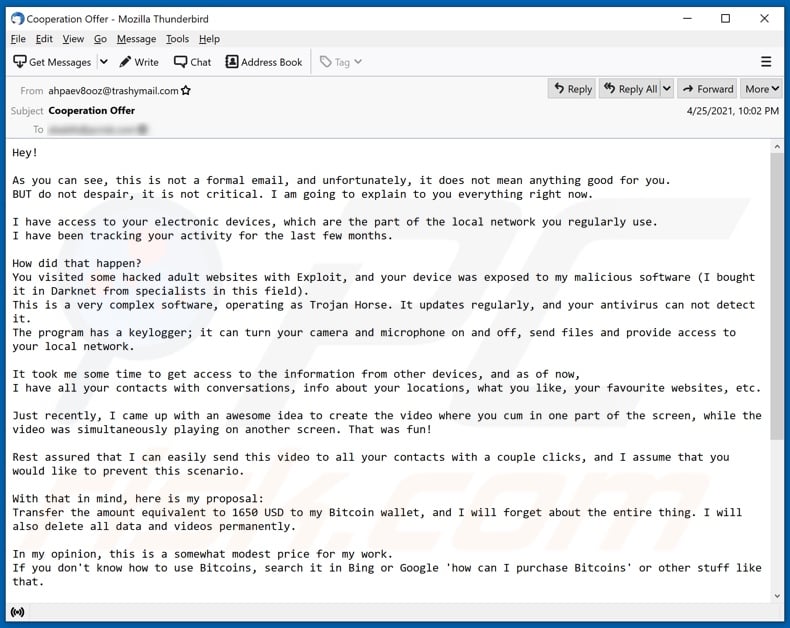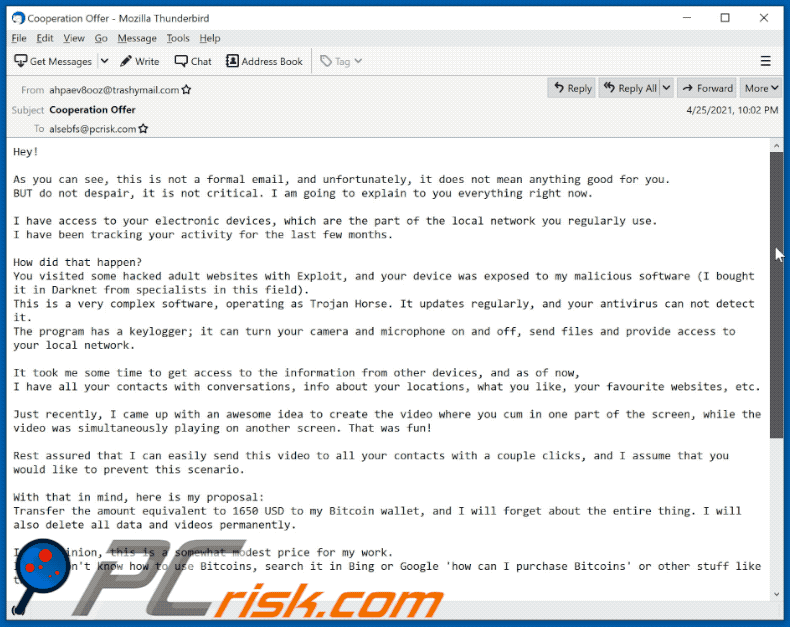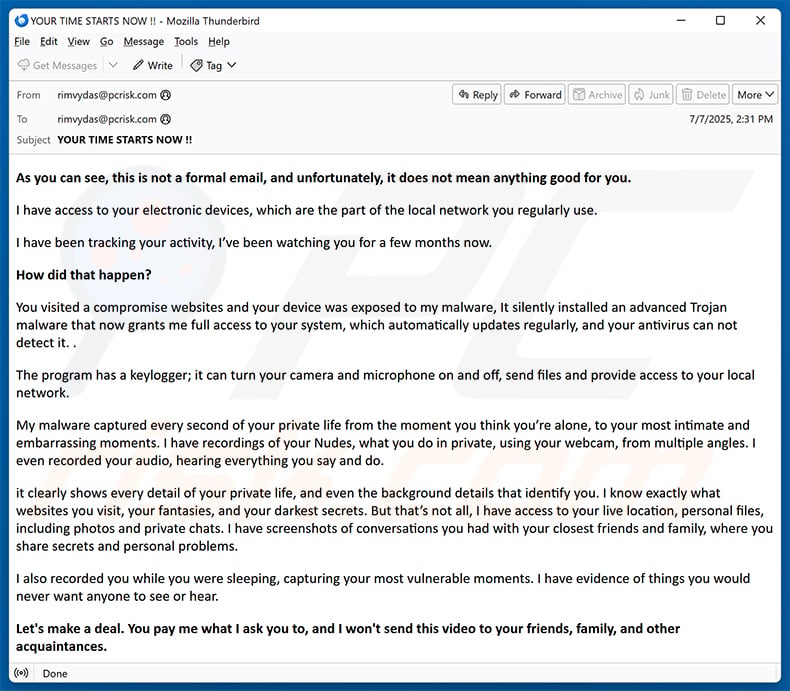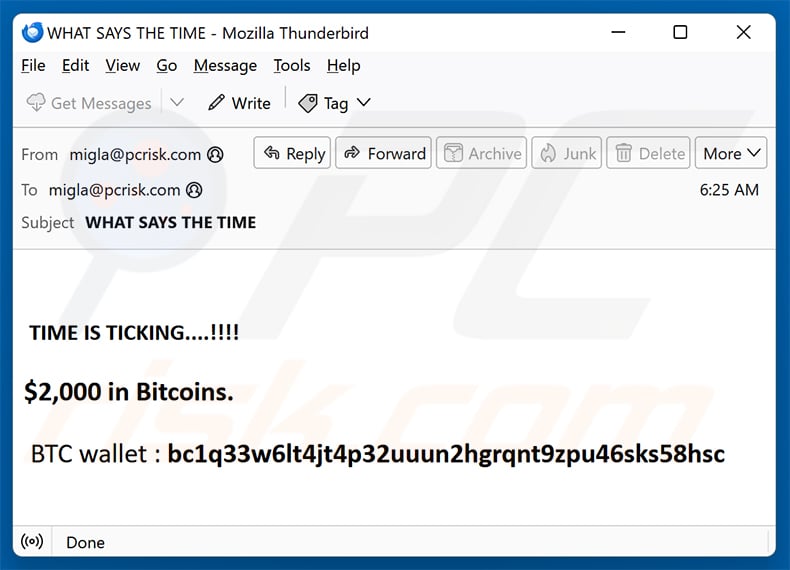Do not trust the claims of "this is not a formal email" scam letters
Phishing/ScamAlso Known As: This Is Not A Formal Email spam
Get free scan and check if your device is infected.
Remove it nowTo use full-featured product, you have to purchase a license for Combo Cleaner. Seven days free trial available. Combo Cleaner is owned and operated by RCS LT, the parent company of PCRisk.com.
What is the "this is not a formal email" scam letter?
"This is not a formal email" is the name of a scam campaign - a large-scale operation during which thousands of deceptive emails are sent. This campaign uses the sextortion scam model. In other words, the letter sender proclaims to have made an explicit, compromising video of the recipient - and threatens to publicize it unless they are paid.
It must be be emphasized that none of the information provided by these emails - is true. Most importantly, the recording does not actually exist. Hence, the "this is not a formal email" letters have to be ignored.

The "this is not a formal email" scam letters (subject/title "Cooperation Offer"; may vary) make the false claims of having infected the recipients' devices with malware a few months prior. The imaginary malicious program is supposedly capable of making recordings via the devices' cameras and microphones, keylogging (recording key-strokes), self-updating (to avoid detection by anti-virus software), sending files, and providing access to the local networks.
The sender states to have obtained the recipients' browsing activity (visited URLs, viewed pages, etc.), contact lists, geolocation, and other vulnerable data. The crux of the scam is the bogus claim that a compromising video has been created from recordings of the recipients while they were watching adult content.
Allegedly, the fake trojan managed to infiltrate the devices through one such website. The scam emails instruct recipients to pay 1650 USD in Bitcoin cryptocurrency - to prevent the nonexistent video from being sent to their contacts.
The ransom has to be paid within 55 hours. The sender also threatens to publicize the recording online if they find out that recipients mentioned the email to anyone.
As mentioned in the introduction, "this is not a formal email" is a scam, and none of its threats can be carried out by the scammers. Therefore, it is strongly advised to disregard this email and others similar to it.
| Name | This Is Not A Formal Email Scam |
| Threat Type | Phishing, Scam, Social Engineering, Fraud |
| Fake Claim | Scam emails claim an explicit video of a sexual nature featuring the recipient has been obtained by the sender. |
| Ransom Amount | 1650 USD in Bitcoin cryptocurrency |
| Cyber Criminal Cryptowallet Address | bc1q33w6lt4jt4p32uuun2hgrqnt9zpu46sks58hsc, 1MK7VnGrPM8T8Z7jm3b4V6FDinSNHbUAyt, 1Cg1X5xS6wkLqPksNcsVzm41Mf24PsrE1 |
| Symptoms | Unauthorized online purchases, changed online account passwords, identity theft, illegal access of the computer. |
| Distribution methods | Deceptive emails, rogue online pop-up ads, search engine poisoning techniques, misspelled domains. |
| Damage | Loss of sensitive private information, monetary loss, identity theft. |
| Malware Removal (Windows) |
To eliminate possible malware infections, scan your computer with legitimate antivirus software. Our security researchers recommend using Combo Cleaner. Download Combo CleanerTo use full-featured product, you have to purchase a license for Combo Cleaner. 7 days free trial available. Combo Cleaner is owned and operated by RCS LT, the parent company of PCRisk.com. |
"I have to share bad news with you", "I monitored your device on the net for a long time", "Within 96 hours I'll ruin your prestige", "I am a professional programmer who specializes in hacking", and "I have got two not really pleasant news for you" are some examples of other sextortion spam campaigns.
Deceptive letters can have a wide variety of disguises and make likewise varied claims - in order to generate revenue at user expense. These emails can be used for different scams, phishing, and malware proliferation (e.g., trojan, ransomware, etc.).
Due to how widespread spam mail is, it is highly recommended to exercise caution with incoming emails.
How do spam campaigns infect computers?
Spam campaigns spread malware via infectious files distributed through them. Virulent files can be attached to the scam emails, and/or the letters can contain download links of such content.
These files can be in various formats, e.g., Microsoft Office and PDF documents, archives (ZIP, RAR, etc.), executables (.exe, .run, etc.), JavaScript, and so forth. When the files are executed, run, or otherwise opened - the infection process (malware download/installation) is triggered.
For example, Microsoft Office documents cause infections by executing malicious macro commands. This process is automatic (jumpstarted when a document is opened) in Microsoft Office versions released before 2010.
Newer versions have "Protected View" mode that prevents immediate execution of macros. Instead, users are asked to enable editing/content (macro commands) and warned of the potential risks.
How to avoid installation of malware?
Suspect and irrelevant emails must not be opened, especially any attachments or links present in them. It is recommended to use Microsoft Office versions released after 2010.
However, malicious software is not proliferated through spam campaigns exclusively. It is also distributed via untrustworthy download channels (e.g., unofficial and free file-hosting websites, Peer-to-Peer sharing networks, and other third-party downloaders), illegal activation tools ("cracks"), and fake updates.
Therefore, it is advised to only use official and verified download sources. Additionally, all programs must be activated and updated with tools/functions provided by legitimate developers.
To ensure device/user safety, it is crucial to have a dependable anti-virus/anti-spyware suite installed and kept up-to-date. Furthermore, this software has to be used to run regular system scans and remove detected threats and issues.
If you've already opened malicious attachments, we recommend running a scan with Combo Cleaner Antivirus for Windows to automatically eliminate infiltrated malware.
Text presented in the "this is not a formal email" scam letter:
Subject: Cooperation Offer
Hey!
As you can see, this is not a formal email, and unfortunately, it does not mean anything good for you.
BUT do not despair, it is not critical. I am going to explain to you everything right now.
I have access to your electronic devices, which are the part of the local network you regularly use.
I have been tracking your activity for the last few months.
How did that happen?
You visited some hacked adult websites with Exploit, and your device was exposed to my malicious software (I bought it in Darknet from specialists in this field).
This is a very complex software, operating as Trojan Horse. It updates regularly, and your antivirus can not detect it.
The program has a keylogger; it can turn your camera and microphone on and off, send files and provide access to your local network.
It took me some time to get access to the information from other devices, and as of now,
I have all your contacts with conversations, info about your locations, what you like, your favourite websites, etc.
Just recently, I came up with an awesome idea to create the video where you cum in one part of the screen, while the video was simultaneously playing on another screen. That was fun!
Rest assured that I can easily send this video to all your contacts with a couple clicks, and I assume that you would like to prevent this scenario.
With that in mind, here is my proposal:
Transfer the amount equivalent to 1650 USD to my Bitcoin wallet, and I will forget about the entire thing. I will also delete all data and videos permanently.
In my opinion, this is a somewhat modest price for my work.
If you don't know how to use Bitcoins, search it in Bing or Google 'how can I purchase Bitcoins' or other stuff like that.
My Bitcoin wallet: 1Cg1X5xS6wkLqPksNcsVzm41Mf24PsrE1
You have 55 hours to reply and you should also bear the following in mind:
It makes no sense to reply me - the address has been generated automatically.
It makes no sense to complain either, since the letter along with my Bitcoin wallet cannot be tracked.
Everything has been orchestrated precisely.
If I ever detect that you mentioned anything about this letter to anyone - the video will be immediately shared, and your contacts will be the first to receive it.
Following that, the video will be posted on the web!
Remember! Time tracking will start as soon as you open this email, I am monitoring this!
Good luck and take it easy! It was just bad luck, next time please be careful.
Appearance of the "this is not a formal email" scam letter (GIF):

Another variant of an email from "This Is Not A Formal" spam campaign:

Text presented within:
Subject: YOUR TIME STARTS NOW !!
As you can see, this is not a formal email, and unfortunately, it does not mean anything good for you.
I have access to your electronic devices, which are the part of the local network you regularly use.
I have been tracking your activity, I've been watching you for a few months now.
How did that happen?
You visited a compromise websites and your device was exposed to my malware, It silently installed an advanced Trojan malware that now grants me full access to your system, which automatically updates regularly, and your antivirus can not detect it. .
The program has a keylogger; it can turn your camera and microphone on and off, send files and provide access to your local network.
My malware captured every second of your private life from the moment you think you're alone, to your most intimate and embarrassing moments. I have recordings of your Nudes, what you do in private, using your webcam, from multiple angles. I even recorded your audio, hearing everything you say and do.
it clearly shows every detail of your private life, and even the background details that identify you. I know exactly what websites you visit, your fantasies, and your darkest secrets. But that's not all, I have access to your live location, personal files, including photos and private chats. I have screenshots of conversations you had with your closest friends and family, where you share secrets and personal problems.
I also recorded you while you were sleeping, capturing your most vulnerable moments. I have evidence of things you would never want anyone to see or hear.
Let's make a deal. You pay me what I ask you to, and I won't send this video to your friends, family, and other acquaintances.
You should understand, this is not a joke. I will send it by email, through SMS-link, social media, even post it in mass media.
To avoid this, you should send me $2,000 in Bitcoins on my BTC wallet within 48 hours: bc1q33w6lt4jt4p32uuun2hgrqnt9zpu46sks58hsc
I will delete the video as soon as I receive the money. I will also delete the malicious software from your device, and you will never hear from me again.
I'll give you 48hours, that's more than enough, I think. Time tracking will start as soon as you open this email, I am monitoring this!
And one last thing:
If you don't send me $2,000 in Bitcoin, I will:
Send the videos and photos to all your contacts, family, coworkers, friends, even at work.
Post the videos on social media with your real name and location.
Leak your personal conversations online.
Share screenshots of your online banking and private emails.I am monitoring your device right now. You cannot hide. Your phone microphone is on, and I know when you read this message.
Pay now, or prepare for your worst nightmare.
If you do something stupid , I will immediately share this video.
Time is ticking.
Update July 8, 2025 - Cybercriminals have started using additional tactics to convince recipients that they actually have some material. Few days after receiving the initial email, recipients get a second one as a reminder.
Screenshot of the follow-up email:

Text presented within:
TIME IS TICKING....!!!!
$2,000 in Bitcoins.
BTC wallet : bc1q33w6lt4jt4p32uuun2hgrqnt9zpu46sks58hsc
Instant automatic malware removal:
Manual threat removal might be a lengthy and complicated process that requires advanced IT skills. Combo Cleaner is a professional automatic malware removal tool that is recommended to get rid of malware. Download it by clicking the button below:
DOWNLOAD Combo CleanerBy downloading any software listed on this website you agree to our Privacy Policy and Terms of Use. To use full-featured product, you have to purchase a license for Combo Cleaner. 7 days free trial available. Combo Cleaner is owned and operated by RCS LT, the parent company of PCRisk.com.
Quick menu:
- What is This Is Not A Formal Email spam?
- Types of malicious emails.
- How to spot a malicious email?
- What to do if you fell for an email scam?
Types of malicious emails:
![]() Phishing Emails
Phishing Emails
Most commonly, cybercriminals use deceptive emails to trick Internet users into giving away their sensitive private information, for example, login information for various online services, email accounts, or online banking information.
Such attacks are called phishing. In a phishing attack, cybercriminals usually send an email message with some popular service logo (for example, Microsoft, DHL, Amazon, Netflix), create urgency (wrong shipping address, expired password, etc.), and place a link which they hope their potential victims will click on.
After clicking the link presented in such email message, victims are redirected to a fake website that looks identical or extremely similar to the original one. Victims are then asked to enter their password, credit card details, or some other information that gets stolen by cybercriminals.
![]() Emails with Malicious Attachments
Emails with Malicious Attachments
Another popular attack vector is email spam with malicious attachments that infect users' computers with malware. Malicious attachments usually carry trojans that are capable of stealing passwords, banking information, and other sensitive information.
In such attacks, cybercriminals' main goal is to trick their potential victims into opening an infected email attachment. To achieve this goal, email messages usually talk about recently received invoices, faxes, or voice messages.
If a potential victim falls for the lure and opens the attachment, their computers get infected, and cybercriminals can collect a lot of sensitive information.
While it's a more complicated method to steal personal information (spam filters and antivirus programs usually detect such attempts), if successful, cybercriminals can get a much wider array of data and can collect information for a long period of time.
![]() Sextortion Emails
Sextortion Emails
This is a type of phishing. In this case, users receive an email claiming that a cybercriminal could access the webcam of the potential victim and has a video recording of one's masturbation.
To get rid of the video, victims are asked to pay a ransom (usually using Bitcoin or another cryptocurrency). Nevertheless, all of these claims are false - users who receive such emails should ignore and delete them.
How to spot a malicious email?
While cyber criminals try to make their lure emails look trustworthy, here are some things that you should look for when trying to spot a phishing email:
- Check the sender's ("from") email address: Hover your mouse over the "from" address and check if it's legitimate. For example, if you received an email from Microsoft, be sure to check if the email address is @microsoft.com and not something suspicious like @m1crosoft.com, @microsfot.com, @account-security-noreply.com, etc.
- Check for generic greetings: If the greeting in the email is "Dear user", "Dear @youremail.com", "Dear valued customer", this should raise suspiciousness. Most commonly, companies call you by your name. Lack of this information could signal a phishing attempt.
- Check the links in the email: Hover your mouse over the link presented in the email, if the link that appears seems suspicious, don't click it. For example, if you received an email from Microsoft and the link in the email shows that it will go to firebasestorage.googleapis.com/v0... you shouldn't trust it. It's best not to click any links in the emails but to visit the company website that sent you the email in the first place.
- Don't blindly trust email attachments: Most commonly, legitimate companies will ask you to log in to their website and to view any documents there; if you received an email with an attachment, it's a good idea to scan it with an antivirus application. Infected email attachments are a common attack vector used by cybercriminals.
To minimise the risk of opening phishing and malicious emails we recommend using Combo Cleaner Antivirus for Windows.
Example of a spam email:

What to do if you fell for an email scam?
- If you clicked on a link in a phishing email and entered your password - be sure to change your password as soon as possible. Usually, cybercriminals collect stolen credentials and then sell them to other groups that use them for malicious purposes. If you change your password in a timely manner, there's a chance that criminals won't have enough time to do any damage.
- If you entered your credit card information - contact your bank as soon as possible and explain the situation. There's a good chance that you will need to cancel your compromised credit card and get a new one.
- If you see any signs of identity theft - you should immediately contact the Federal Trade Commission. This institution will collect information about your situation and create a personal recovery plan.
- If you opened a malicious attachment - your computer is probably infected, you should scan it with a reputable antivirus application. For this purpose, we recommend using Combo Cleaner Antivirus for Windows.
- Help other Internet users - report phishing emails to Anti-Phishing Working Group, FBI’s Internet Crime Complaint Center, National Fraud Information Center and U.S. Department of Justice.
Share:

Tomas Meskauskas
Expert security researcher, professional malware analyst
I am passionate about computer security and technology. I have an experience of over 10 years working in various companies related to computer technical issue solving and Internet security. I have been working as an author and editor for pcrisk.com since 2010. Follow me on Twitter and LinkedIn to stay informed about the latest online security threats.
PCrisk security portal is brought by a company RCS LT.
Joined forces of security researchers help educate computer users about the latest online security threats. More information about the company RCS LT.
Our malware removal guides are free. However, if you want to support us you can send us a donation.
DonatePCrisk security portal is brought by a company RCS LT.
Joined forces of security researchers help educate computer users about the latest online security threats. More information about the company RCS LT.
Our malware removal guides are free. However, if you want to support us you can send us a donation.
Donate
▼ Show Discussion